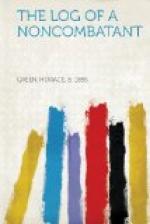It was two days after the second bombardment of Termonde—at 7 A.M., to be exact—that Luther and I started from Ghent for Brussels in a military automobile, the property of the Belgian Government, and again loaned for the occasion to Julius Van Hee, American Vice-Consul, then Acting Consul at Ghent. We carried with us a United States Government mail pouch, a packet of mail from Dr. Henry van Dyke, at The Hague, addressed to Brand Whitlock, the American Minister at Brussels, and another packet of mail from Henry W. Diederick, United States Consul-General at Antwerp. Mr. Van Hee hoped to obtain from the German authorities in Brussels some smallpox vaccine to take back to Ghent, where a smallpox epidemic was feared.
Once out of the town limits of Ghent we bowled along at top speed, with the American colors trembling fore and aft and impressive-looking signs pasted on windshield and side-flaps. The autumn rains descended heavily upon us, drenching everything except the carefully protected mail bags.
Six miles southeast of Ghent, we ran into a regiment of Belgian infantry moving back from the direction of Brussels, and farther on a squad of cavalry and some more cavalry outposts; then two companies of bicycle patrol, the men with their heads bent over the handlebars, Mausers slung over their shoulders, pedaling heavily through the mud and slush of a cold September storm. A few mitrailleuses, known as the Minerva type, and mounted on armored motor-cars, were trained on the ravine through which the road dipped a thousand yards ahead of us. They had sighted the German outposts on the crest of a hill opposite us about three quarters of a mile away. In a very poor kind of trench, hastily constructed in the beet-fields, and little more than body deep, the men lay on their bellies in the mud, nervously fingering their muskets and adjusting the sights. A third company of bicycle scouts were ordered to advance for the purpose of drawing fire.
I doubt if that particular body of men had ever before been under fire. Never was the fear of death more plainly written on human face. All of the men went ahead without flinching or failing, but the muscles of their jaws were knotted, their faces were the color of chalk, and one or two dismounted for a moment, subject to the physical effects of fear. I have seen men tremble before important physical contests: Jeffries, stepping into the prize ring at Reno, Nevada, ready for the beating of his life and the loss of reputation. I have seen murderers condemned to death. Charles Becker, as I watched him taking his death sentence that evening in the Criminal Courts Building, did not give one the same uncanny feeling as this handful of Belgian scouts pedaling out to meet the German fire. I do not intend to say the Belgians were not brave men, for this was an isolated instance. And indeed there was something gruesome about that little company offered for the slaughter, simply for the purpose of locating the German batteries. The men understood the meaning of the order and appreciated the odds against them.




